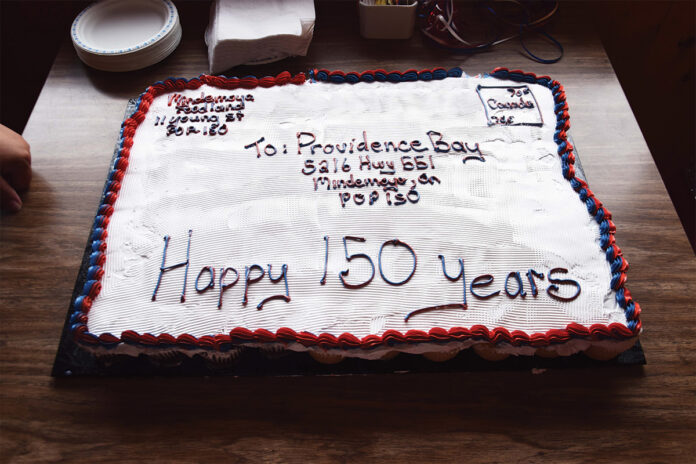SUDBURY—The Rainbow District School Board (RDSB) is hoping that new rules designed to keep students off their cellphones will allow the students to focus on learning while they are in class. A local teachers union president said the guidelines put in place by the board is a good balanced approach.
“Eliminating distractions will protect instructional time and enable educators and students to focus on teaching and learning, student achievement and well-being,” stated Bruce Bourget, director of education for the RDSB. He told the board at a meeting August 27, “as directed by the Ministry of Education, RDSB’s new administrative procedure on personal mobile devices comes into effect when classes resume on Tuesday, September 3.”
Mr. Bourget said that the measures taken are supported by parents, staff, students and community members based on a survey taken by the board in June. “We had over 2,000 respondents to our survey, which is a really good number,” he told The Expositor. He explained one of the questions was whether cell phones and social media use at school is a concern, with 84.5 percent of respondents saying yes. Eighty-seven percent are concerned with the impact of moderate time students spend on social media contributing to poor mental health. The third survey question asked if there are concerns with distractions between teachers and learners with unapproved cell phone and social media use, with 85.5 percent of respondents saying yes to this.
“The ministry made the requirement for administrative procedures and the survey demonstrated the overwhelming majority see having students focus on learning and having less distractions in the classroom is important,” said Mr. Bourget. “So, we are asking students unless approached by their teacher permitting cellphone use for educational purposes, to keep their cellphones in their locker during class instructional time.”
“We want teachers to be able to teach without being disturbed by students viewing their cell phones, and for students to remain focused on what is being taught in the classroom,” said Mr. Bourget. He said as far as the possibility of having phones stored in one location in a class, at the beginning of class and handing them out again at the end of each class, “storing phones is not a good use of instruction time. Even if you are looking at five minutes at the start of class for the storing of phones and five minutes at the end of each class, (times four classes per day), students would be losing 40 minutes of teaching and learning storing phones.”
“Eliminating distractions will protect instructional time and enable educators and students to focus on teaching and learning,” said Mr. Bourget. “We thank our parents/guardians and students for their continued support as we work together to foster positive school climates for student achievement and well-being.”
“There has always been a cellphone policy ban provincially,” said Eric Laberge, district president for the Ontario Secondary School Teachers Federation (OSSTF). “It didn’t just start this year. But what the board has put in place as outlined by the ministry (of education) is the expected minimum guidelines of enforcement is what has been put in place. That policy has not changed much for the classroom teacher. The premise is that cellphones and all mobile devices are to be put out of site and on silent mode was already the practice. But now students are to put their cellphones in their locker and leave them there.”
“Absolutely, we are in support of the measures taken,” said Mr. Laberge. “There will be growing pains, parents and students will have to get used to, but it is designed so that students are focused on learning and teachers on teaching.”
“Non-compliance will now be dealt with by the school office administration,” said Mr. Laberge. “The (RDSB) has struck a good balance of meeting the provincial objectives and taken the onus on enforcement off the front-line teachers. It is a commonsense approach.”
For students in Grade 6 and below, personal mobile devices are to be stored in lockers or assigned personal spaces out of view and powered off or set to silent/do not disturb mode throughout the full instructional day.
For all Grade 7 to 12 students, personal mobile devises are to be stored in lockers or assigned personal spaces out of view and powered off or set to silent/do not disturb mode during the instructional period.
Access to social media sites will also be restricted throughout the school day.
Cellphone use will be permitted for educational purposes, as directed by an educator, and, in specific situations, for health and medical purposes and to support special education needs.
Mobile device use in secondary schools will be permitted before the start of the school day, at lunch and after school.
Mr. Bourget noted, “mobile devices can be used at lunch and outside school. And of course, if a parent needs to get in touch with their children they can call the main office at the school.”
“We also heard that many students feel the guidelines will help them focus and keep the pressure off to respond to social media in class,” said Mr. Bourget.
The changes are outlined in the RDSB Guide for Students and Parents/ Guardians for the 2024-2025 School Year, which includes an updated Code of Conduct and a video.
“We do think as the survey respondents have agreed, that these restrictions are a very good thing to have in place,” continued Mr. Bourget. “We support staff and students and feel this will prove to be a very good thing over time.”





